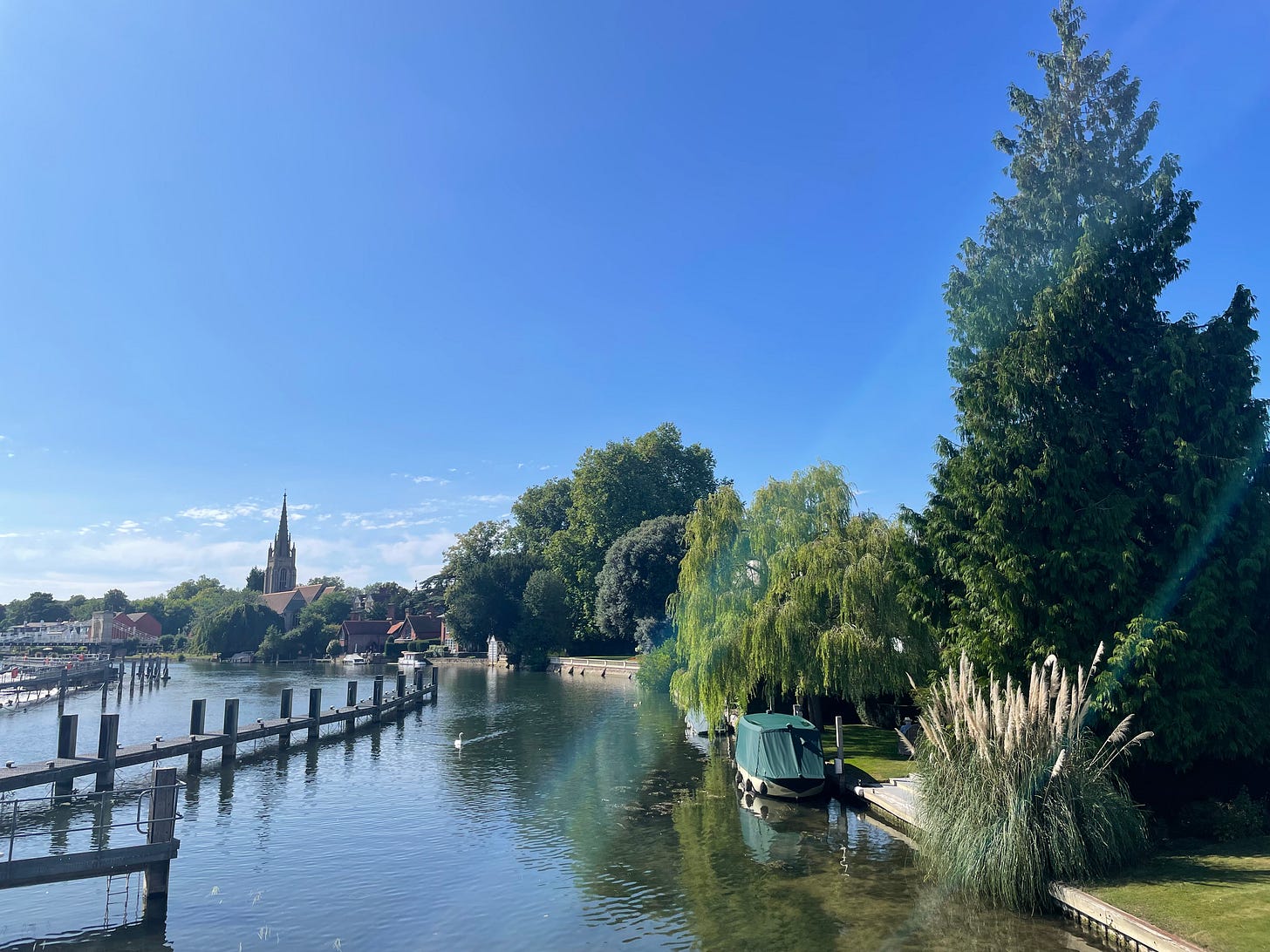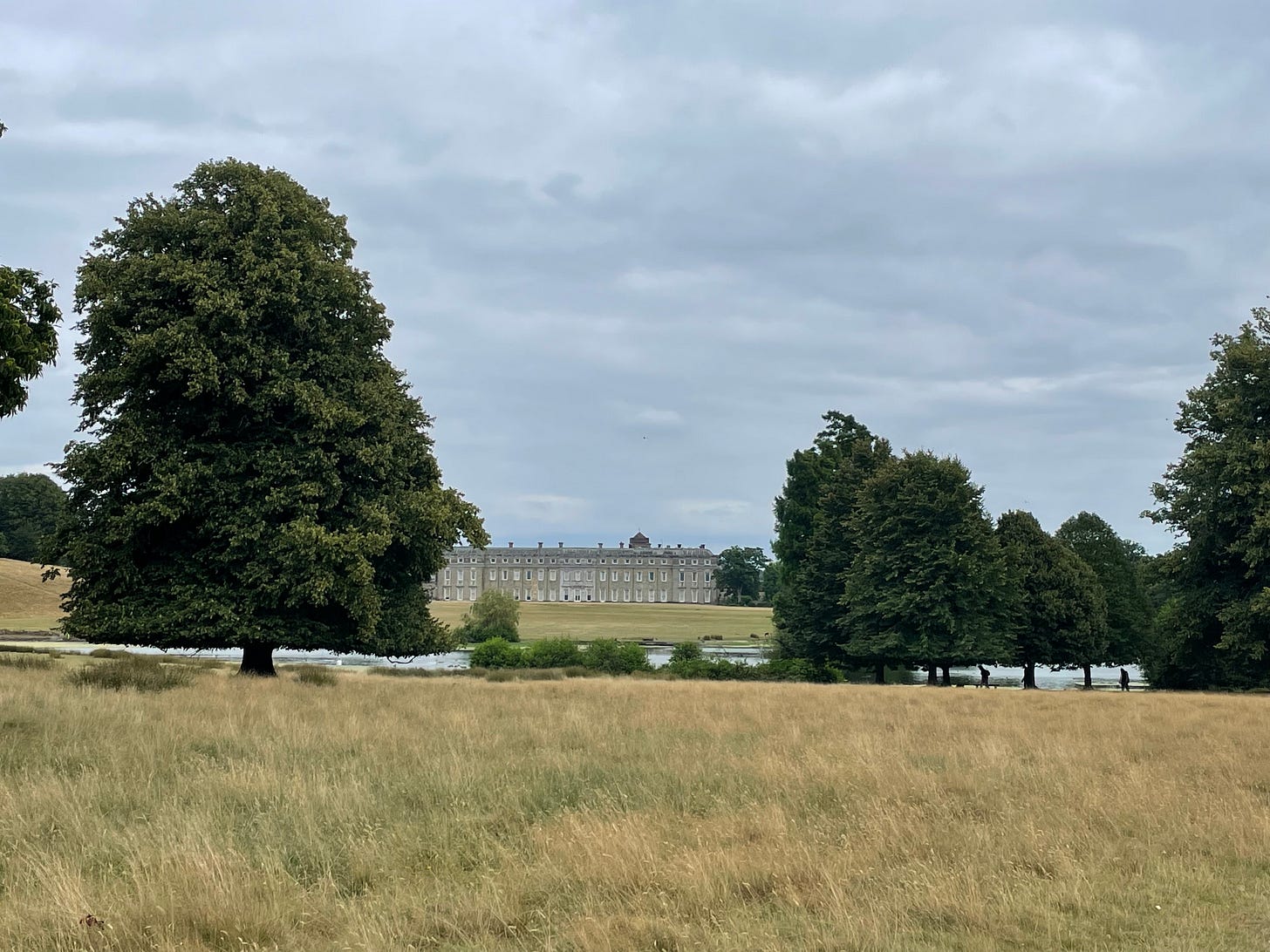Unbelievably, I am already back at school. The air in London has turned crisp and cool in the mornings, and the pavements are littered with fallen leaves. The trees are starting to look burnished around the edges, and the flowers in my local park are almost spent. The blackberries poking through the fence at the bottom of my communal garden have become ripe for the picking. August is about to bleed into September, taking Summer with it for another year. As always, it wasn't long enough. But I made the most of it.
After getting back from New York at the beginning of August, I needed a week to recover from whatever hideous plane lurgy I had picked up, as well as from the utter exhaustion of walking 30,000 steps every day for seven days in 35 degree heat. I’m not often ill, so when I am, I make the most of it - I go full on Victorian invalid and take to my sofa with plenty of blankets, trays full of nourishing things and piles of books. I absolutely loved having a week where I had a legitimate reason not to do anything other than relax and read, and where my biggest exertion was going up the road to the ice cream parlour (if you’re ever in Islington, you must try Udderlicious - they do the best ice cream). While on the sofa, I read the marvellous The Ladies’ Paradise by Émile Zola, which I’ve been wanting to read for years, and finally got around to as Simon and I had decided to do a podcast episode on it, which you can listen to here. I love books that feature workplaces - I find it fascinating to go behind the scenes and catch a glimpse into the day-to-day minutiae of a professional world different to my own. Zola carried out so much research into the workings of a department store, and it shows on every page. His hero - Octave Moret - is a visionary businessman who has taken his late wife’s small silk store and transformed it into ‘The Ladies’ Paradise’ - a one-stop shop for everything a woman might need for her body and her home. He dreams of expanding further and taking over an entire city block, creating a palace dedicated to women and their needs, and making his fortune in the process. He understands that volume of sales will lead to profit, so he slashes his prices to lure in customers, ruining the trade of the small, old fashioned shops in the vicinity, all of whom hate him and are resisting the modernity The Ladies’ Paradise represents. His heroine, Denise, is a pure hearted innocent from the country, devoted to the care of her younger brothers after the death of their parents. She starts working at The Ladies’ Paradise, and we see the shop floor through her eyes - the competitiveness of the sales assistants who get commissions on their sales, and so undermine and sabotage one another to get the best customers, the demands of rude customers, the exhaustion of being on your feet all day, the struggle to make ends meet on a tiny salary. I loved the lavish, loving descriptions of the shop displays, and the discussions of various innovations Mouret wanted to make to lure in more customers. I loved the bitchy silk salesmen, trying to get their manager sacked so they could get a promotion. I loved the description of the clothing and the fabric and the little details that revealed the material culture of this period of time. There is a sumptuousness about this novel that makes you want to sink into it - it’s long and bloated and saccharine and very Victorian, but glorious nonetheless. The perfect novel for a summer sickbed.
Once recovered, I was back out and about again. I had booked in two UK mini breaks to soften the blow of my summer holiday coming to an end, and I had a lovely time exploring two areas of the country I’ve not really spent as much time in as I should have. The first was a night in Petworth, in West Sussex, where my friend had discovered this amazing B&B in an old railway station. We drove down and spent a pleasant hour or two at Petworth house, which is an enormous barn of a place now looked after by the National Trust, and houses a huge art collection. The house itself I didn’t like - it was built merely to show off and not as a home, and it feels cold and unloved and barren - but the art collection is amazing, and the grounds are beautiful. Exiting through a door in the servants’ quarters takes you directly into the pretty town, where there are plenty of lovely little shops to potter around. After exploring Petworth and then checking into our B&B, we decided that the glorious sunny evening shouldn’t be wasted, so I drove us down to West Wittering, which has a glorious long sandy beach. We sat on the beach and chatted until the sun went down, watching the light playing over the water. The next day, we went to Chichester in the morning, which has such a lovely cathedral - home of Philip Larkin’s famous Arundel Tomb and a beautiful Marc Chagall stained glass window - and the fabulous Pallant House Gallery, which alongside being a brilliant gallery of modern art, also has the most fantastic art bookshop, including vintage and antique books. I couldn’t resist picking up Carolyn Trant’s fantastic sounding Voyaging Out: British Women Artists from Suffrage to the Sixties, which I can’t wait to read. After we’d taken our fill of Chichester, we drove back towards home, stopping off at Standen on the way, another National Trust property. It’s a beautiful Arts and Crafts house designed by Philip Webb, who worked with William Morris, and entirely decorated and furnished by Morris & Co. Lived in by the same family until it was given to the National Trust in the 1970s, it’s a fabulous time capsule and a must-see for Morris fans. We loved it, and it was the perfect way to finish our mini break.
The following day I was off again, this time with my sister, to the Chilterns. We were staying in an airbnb in Oxfordshire, and en route, we stopped in the beautiful Thameside town of Marlow, which has a glorious bridge across the river, fantastic riverside walks, and streets full of beautiful Georgian and Victorian houses, quirky independent shops and lovely cafés. We really enjoyed pottering around and soaking up the sun by the river, watching the boats go by. That night, we had a delicious meal in the magical garden of a local pub, and then the following day, my sister very obligingly drove the hour or so into the Cotswolds so we could visit somewhere I have dreamed of going for years - Kelmscott Manor, home of William Morris and later his daughter, May. It was just as magical as I had hoped, and the surrounding village and countryside were so breathtakingly pretty that I could understand why Morris had decided to set up home here. The house itself is humble and simple inside, sparsely but beautifully furnished, and with plenty of fascinating information about the family and their circle. There is a fabulous café and shop, too, and you can go off for a walk through the village to see some of the buildings built after Morris’ death to commemorate his life, as well as the local church, where the family are buried. I loved every minute - if you find yourself in the area, I strongly recommend a visit.
The following day, we spent the morning pottering around Henley-on-Thames, which is a larger version of Marlow, and famous for being the base of many of Team GB’s Olympic rowers - it has a lovely stretch of waterfront along the Thames and a lively and pretty town centre with plenty of shops and cafés to enjoy. Walking around in the sunshine in such lovely tranquil places made the world and its troubles feel a million miles away. It was a perfect way to end my summer holiday, and made even more perfect by getting to spend some quality time with my sister.
Now, it’s back to the grindstone, but I’m looking forward to getting started on a new school year with new classes to teach, as well as the variety of theatre and art exhibitions that are opening over the next couple of months. I always feel a sadness as the long, lazy days of summer draw to a close, but Autumn has so many delights of its own that it’s hard to feel sad for too long. Even so, it’s not over yet - the sun is still shining and I’m still wearing shorts. We’ll see how long that lasts!









